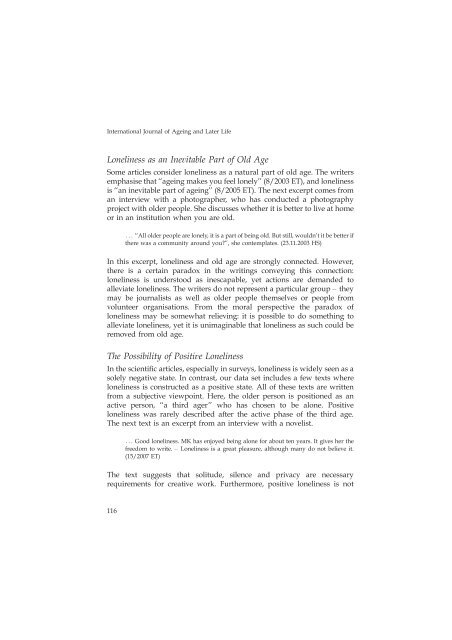Avaa tiedosto - TamPub - Tampereen yliopisto
Avaa tiedosto - TamPub - Tampereen yliopisto
Avaa tiedosto - TamPub - Tampereen yliopisto
Create successful ePaper yourself
Turn your PDF publications into a flip-book with our unique Google optimized e-Paper software.
International Journal of Ageing and Later Life<br />
Loneliness as an Inevitable Part of Old Age<br />
Some articles consider loneliness as a natural part of old age. The writers<br />
emphasise that ‘‘ageing makes you feel lonely’’ (8/2003 ET), and loneliness<br />
is ‘‘an inevitable part of ageing’’ (8/2005 ET). The next excerpt comes from<br />
an interview with a photographer, who has conducted a photography<br />
project with older people. She discusses whether it is better to live at home<br />
or in an institution when you are old.<br />
... ‘‘All older people are lonely, it is a part of being old. But still, wouldn’t it be better if<br />
there was a community around you’’, she contemplates. (23.11.2003 HS)<br />
In this excerpt, loneliness and old age are strongly connected. However,<br />
there is a certain paradox in the writings conveying this connection:<br />
loneliness is understood as inescapable, yet actions are demanded to<br />
alleviate loneliness. The writers do not represent a particular group they<br />
may be journalists as well as older people themselves or people from<br />
volunteer organisations. From the moral perspective the paradox of<br />
loneliness may be somewhat relieving: it is possible to do something to<br />
alleviate loneliness, yet it is unimaginable that loneliness as such could be<br />
removed from old age.<br />
The Possibility of Positive Loneliness<br />
In the scientific articles, especially in surveys, loneliness is widely seen as a<br />
solely negative state. In contrast, our data set includes a few texts where<br />
loneliness is constructed as a positive state. All of these texts are written<br />
from a subjective viewpoint. Here, the older person is positioned as an<br />
active person, ‘‘a third ager’’ who has chosen to be alone. Positive<br />
loneliness was rarely described after the active phase of the third age.<br />
The next text is an excerpt from an interview with a novelist.<br />
... Good loneliness. MK has enjoyed being alone for about ten years. It gives her the<br />
freedom to write. Loneliness is a great pleasure, although many do not believe it.<br />
(15/2007 ET)<br />
The text suggests that solitude, silence and privacy are necessary<br />
requirements for creative work. Furthermore, positive loneliness is not<br />
116














